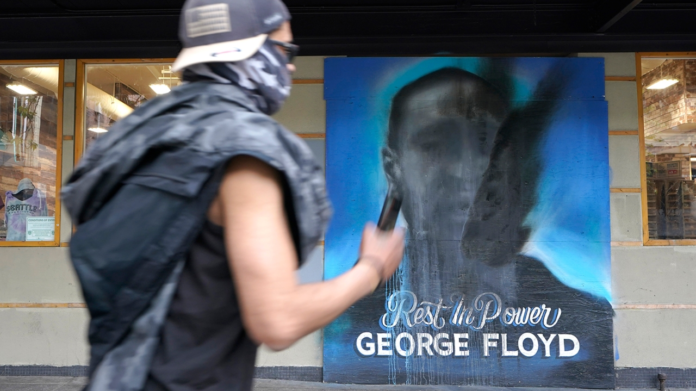The cause of police reform has slipped down the political agenda recently.
Action from Capitol Hill is improbable now that Republicans control the House.
A bipartisan push for modest changes from Sens. Cory Booker (D-N.J.) and Tim Scott (R-S.C.) failed.
And some steam has gone out of the reform movement since the national and international protests over the police murder of George Floyd in Minneapolis in 2020.
On top of all that, crime rates have been on the rise in many major cities, especially during the worst years of the COVID-19 pandemic, 2020 and 2021.
Rising crime rates fuel public anxiety — and typically lead to the election of politicians who promise to be “tough on crime” rather than reform-minded. One prominent example came when former New York City cop Eric Adams won the city’s mayoral race in 2021, having defeated several more left-wing rivals in the Democratic primary.
Now, a new book is making the case for reform, even as it illuminates how difficult true change is to achieve.
“The Riders Come Out at Night” tells the story of the scandal-plagued Oakland Police Department and the battle for reform.
The book’s title refers to the self-chosen name of a renegade group of cops whose existence came to light more than 20 years ago after a rookie colleague, Keith Batt, went public with what he had seen.
“He witnessed egregious abuses and crimes while on duty — framing suspects, shooting a dog, planting narcotics on people, beating confessions out of them,” one of the book’s co-authors, Ali Winston, told The Hill.
The allegations — especially because they were made by someone who had served within the police department, albeit briefly — caused outrage when they became public.
The end result, however, delivered a mixed message.
Twice, criminal trials involving members of “The Riders” ended with the jury deadlocking on some charges and acquitting on others. But the city of Oakland settled a related civil rights lawsuit for almost $11 million in 2003.
Crucially, however, the settlement process also required the police department to commit to major reforms. Much of “The Riders Come Out at Night” is given over to describing the halting attempts to fulfill those goals.
In the process, it traces a number of appalling cases that roil the city — including, most famously, the killing of 22-year-old Oscar Grant in the first hours of 2009, which became the basis for the 2013 movie “Fruitvale Station.” Grant was killed by a member of the Bay Area Rapid Transit Police, not the Oakland Police Department, but the protests that followed took aim at broad injustices at the hands of law enforcement.
There are some more hopeful elements to the story too, including the brief tenure of Chief Sean Whent atop the Oakland Police Department. The authors credit Whent for instituting a number of positive changes, albeit imperfectly, during his three-year run.
One example, cited by the book’s other co-author, Darwin BondGraham, was a shift in how officers conducted foot chases from “an aggressive tactic [that] frequently led to police officers trapping people in backyards or crawl spaces and shooting them” to one in which “the goal is not to catch them at all costs, the goal is to catch them safely. And, in the end, we saw police officer shootings plummet in Oakland.”
Overall, BondGraham added, “it’s this long story of making some progress, making some changes, some backsliding, some intransigence by people within the police department. … It’s a really complicated story.”
The book is far from a polemic. But both authors — Winston is an independent journalist, BondGraham the news editor for the local website The Oaklandside — are clearly sympathetic to the cause of reform.
In political terms, that battle is often fought between those on the left who, at the most radical edge, want to defund the police and those on the right who believe that the harshest police practices deliver the best results.
Winston and BondGraham argue this is a false dichotomy.
Reform, they say, has the capacity to give the police greater legitimacy, which in turn makes it more effective.
“There are many people within law enforcement who would say that that’s actually essential,” Winston argues. “You can’t have a modern police force that is viewed, as the [Black] Panthers basically laid out, as an occupying army.”
On the national scene, there is real concern in center-left circles that the “Defund the Police” slogan has hurt Democrats badly. Even President Biden took on the issue in last year’s State of the Union speech, insisting that the best solution was to “fund the police” in ways that enable them to be trained more effectively.
The authors of “The Riders Come Out at Night” are less concerned with national politics and electability than what they consider the imperative to make progress on policing.
BondGraham notes that in his day job reporting local news, he sees the importance of trust between the police and the community when it comes to solving serious crime.
Key information, he argues, often comes to an officer “who has the trust of the community. And these are often the officers who have most embraced some of the reform efforts.”
When it comes to Oakland, he adds, “The city has an intense violent crime problem. That’s, like, not going to go away. So getting rid of the police is totally unrealistic. So the question is, how do you make the police more effective?”
“I think a lot of the reformers,” he added, have that in part as “their ultimate goal.”
Watch The Hill’s full interview with the authors above.
“The Riders Come Out at Night: Brutality, Corruption and Cover-Up in Oakland” by Ali Winston and Darwin BondGraham is out now, published by Simon & Schuster.



